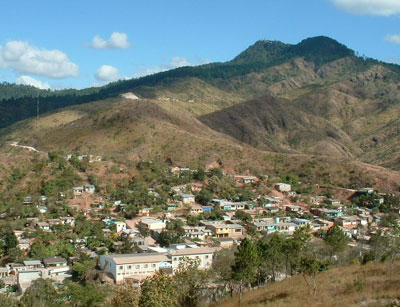The other night I went with my host mom to a prayer service at my neighbor’s house. My neighbor, known best as Dona O, cleans at the elementary school and is one of the kindest and most down-to-earth people I’ve met here. She’s around my parents’ age and she recently lost her mother and father within a couple weeks of each other. Dona Juanita (my host mom) was on her way out the door when she asked if I wanted to come. I went, even though I didn’t know what I was going to. It turned out to be a group of women who filled Dona O’s living room. I was the only one not wearing a skirt or head covering and not carrying a Bible, but that seemed to be ok because I was welcomed with open arms. We first sang a few songs, then a couple women spoke for a while, and finally people took turns praying over Dona O (I just listened). What I kept thinking about was how amazing it was that came together just for her, and clearly cared very deeply about her. They cried together and laughed together. They all gave her hugs and words of comfort. It made me think about how the situation would have likely been different in the U.S. Sure, good friends will go out of their way to comfort someone when they are suffering, but to me the big difference is that Dona O openly accepted it. Surely this huge amount of support made her pain a little bit less. In our American culture I feel like we are so private with our personal lives and with our feelings, and probably would not want to inconvenience people even if they did want to go out of their way to help us. I don’t know if that’s good or bad, I just think it’s interesting. These women also have such a deep love and trust for God, and they kept saying that even in the painful times we can’t turn away from Him, that He is ALWAYS good and will always help us through the pain. I admire that.
A couple of months ago my baby sister, Allison, was very close to death. She was in the hospital for a month and spirits were very low in our house. The doctor said he was going to try one last medication, and if that didn’t work there was no hope for her. To make a long story short, it did work. It felt like a miracle had happened. People came from Marta’s church and packed into our living room for a service of thanksgiving to God. It was really cool to experience. Dona Juanita also told me that when she was sick with diabetes right before I came, a group came to her house every day for the week that she was sick to pray and be with the family. I see other small examples of this kind of community almost every day. It’s definitely not a private culture, which is one thing I am continually trying to adjust to.
It is so inspiring to me to see this kind of solidarity and hope and joy, especially in such an impoverished community. Whenever I see this kind of thing, I have to think that I’m not at all surprised that people living in poverty can still have such joy. They have joy because they truly love God and they love each other. Isn’t there something about that in the Bible somewhere? :) I am again reminded that wealth does not bring happiness. It is solidaridad, loving and being with each other, is that brings happiness. Maybe it’s easier to have that when you don’t have very much else.
Ok, Christmas update: I just found out that we will be spending Christmas with extended family in La Paz! We (Dona Juanita, Paolo, Hector, and I) will leave on the bus around 5:30 tomorrow morning. I’m excited about this because it’s the first time I have gone on any kind of outing with my family; I’m also a little nervous because I have been sick for the past few days, and am hoping that it’s finally passing. I would appreciate your prayers for health and safety while we travel. By the way, in Honduras Christmas is celebrated on the 24th, when I have heard people celebrate into the wee hours of the morning with food and fireworks. The 25th is a day to rest/recover from the day before.
Feliz Navidad a todos!
